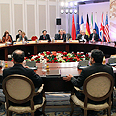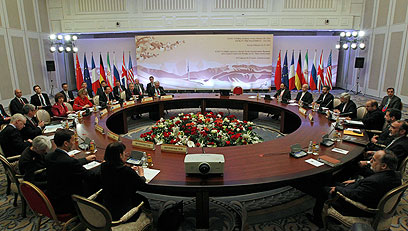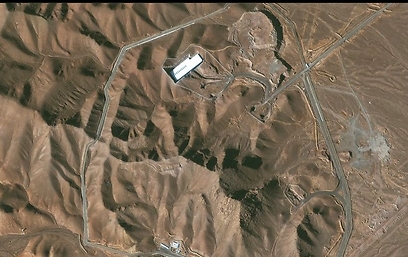
The offer was hailed by Saeed Jalili, Iran's top official at diplomatic talks in Kazakhstan, who said it represented a "turning point" by world powers to compromise on Tehran's uranium enrichment program after years of delicate negotiations that nearly dissolved last June.
Related Stories:
- World powers, Iran wrap up crunch nuclear talks
-
Big powers offer Iran some sanctions relief, await reply
The proposal allows Iran to keep a limited amount of highly enriched uranium – but not make any more – stops short of demanding the full shutdown of an underground nuclear facility, and offers to remove some trade sanctions that have hurt Iran's economy.
Still, a senior US official said, crippling sanctions on Iran's oil and financial industries would remain in place as negotiations continue. The official spoke on condition of anonymity to discuss the sensitive talks more candidly.

The meeting in Kazakhstan (Photo: AP)
The latest offer marked a small but significant shift from earlier, harder-line proposals that prompted Iran to dig in its heels amid fears that an arms race in neighboring states could sow yet more instability in the already turbulent Mideast. Israel has repeatedly hinted its readiness to strike Iranian nuclear facilities – a military venture the United States likely would be dragged into.
The new offer also is expected to force Iran to respond with a reasonable plan of its own – or be seen as a recalcitrant negotiator unwilling to compromise.
The proposal "was more realistic than before and had tried to get closer to the Iranian viewpoint in some cases," Jalili told reporters at the end of two days of negotiations in Kazakhstan's largest city, Almaty. "We consider this positive although there is a long distance to reach the suitable point."
British Foreign Minister William Hague called the talks "useful" and said the new proposal aimed "to build confidence on both sides and move negotiations forward."
"I look forward to further progress," Hague said in a statement.
'World must recognize Iran's rights'
Iran maintains it has the right under international law to enrich uranium to 20 percent, a level that can quickly be elevated into use for nuclear warheads. Tehran claims it needs that level of enriched uranium for reactor fuel and medical isotopes, and has signaled it does not intend to stop. UN nuclear inspectors last week confirmed Iran has begun a major upgrade of its program at the country's main uranium enrichment site.
Iran also insists, as a starting point, that world powers must recognize the republic's right to enrich uranium, and Jalili repeated Wednesday that Tehran must be able to enrich to 20 percent.
"Whatever we need, we will of course pursue that, whether it is five percent or 20 percent," Jalili said. "It is important to us to have the 20 percent."
However, that remains a red line to negotiators from the world powers, the United States, China, Russia, Britain, France and Germany, who put their continued demand that Iran end any uranium enrichment that nears or reaches 20 percent at the heart of the new offer.
The senior US official said Iran would be required to restrict its current stockpile of 20 percent enriched uranium but, in a new development, would be allowed to keep enough to fuel a research reactor in Tehran. Also, Iran would have to suspend operations at its underground nuclear facility at Fordo and make it difficult to restart it quickly, but would no longer be required to fully shut it down.

The fordo uranium enrichment facility
In return, the official said, the US and EU would lift a number of unspecified sanctions on Iran, which was hit with harsh trade restrictions last year in Western hopes they would force Tehran to bend on its nuclear program. Additionally, the UN Security Council and the EU would impose no new nuclear sanctions against Iran.
However, the hardest-hitting sanctions on Iran's oil and financial industries will remain in place during the negotiations, the official said. The tough sanctions have caused unemployment and inflation in Iran to skyrocket, while depressing its daily oil output and value of its currency, the Rial.
There was no deadline on when the new offer might expire, but the official urged Iran to respond quickly because "time is not on their side in many ways."
"There is a cost to Iran for every day that they wait to solve this problem," the US official said. "And they will keep paying those costs, and the cost will go up."
The offer appeared to energize Iran's negotiation efforts: Their diplomats sought out direct talks with more Western officials than previously, although not with the United States. And Iranian negotiators quickly agreed to hold expert-level talks on March 18 in Istanbul to hash out the technical details of the deal, followed by another round of high-level discussions starting April 5 in Almaty.
"I hope the Iranians are looking positively on the proposals we put forward," said EU foreign policy chief Catherine Ashton, who is leading the negotiations. "I believe in looking at what the results are."
The US diplomats in Almaty now head to Saudi Arabia, Jordan and Israel, where they will brief allies on the negotiations' progress. The new offer is likely to frustrate Israel in particular, where Prime Minister Benjamin Netanyahu said Wednesday that Iran may not respond to anything but tougher sanctions and potentially, military force.
- Receive Ynetnews updates
directly to your desktop















